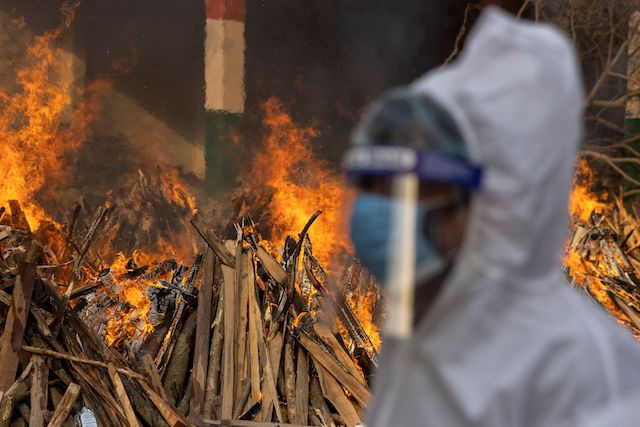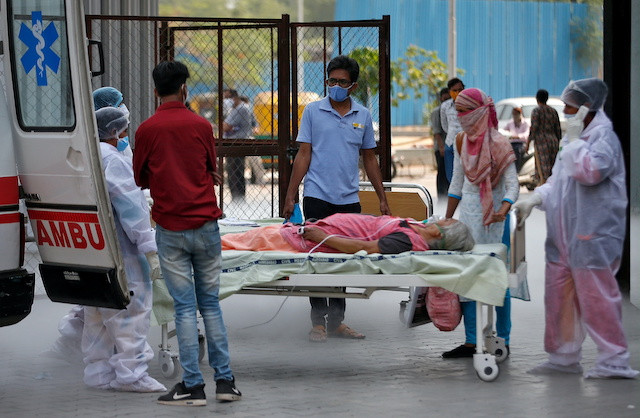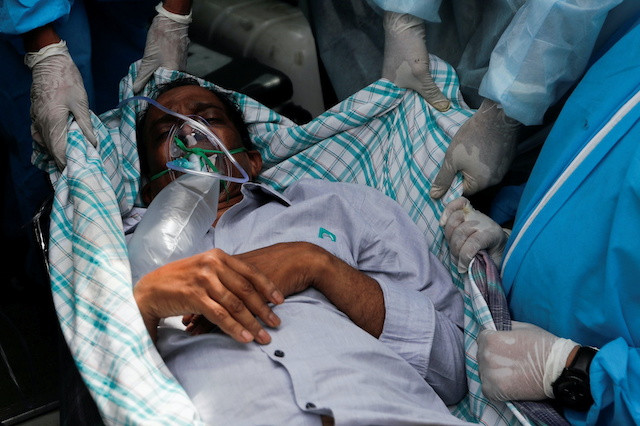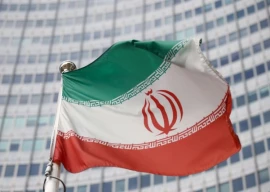
The perils of premature victory
Infectious disease expert Dr Faheem Younus demystifies what went wrong with the second Covid-19 wave in India
DELHI:
For weeks, a monstrous second wave of the novel coronavirus has been ravaging India. After overwhelming healthcare workers and claiming mass casualties in the country’s biggest cities, the surge in Covid-19 is now decimating its rural heartland. And as India gasps for oxygen, there are warnings now of an ‘inevitable’ third wave.
The Express Tribune had reached out earlier to Dr Faheem Younus, the chief of infectious diseases at the University of Maryland. During the conversation, the pre-eminent healthcare expert who received the Presidential Service Award from the Obama administration in 2008 for his humanitarian services had warned of similar catastrophe in Pakistan if adequate steps were not taken. But while those comments were covered in an earlier article, Dr Faheem also shared his assessment on what went wrong in India and whether there is still a chance to turn back the tide against Covid-19.
ET: What can people do in India to prevent the situation from escalating further?
FY: It is way beyond prevention. I think now you can just mitigate and try to do damage control. I don’t think India is at the prevention stage unfortunately. This is what happens if you don’t respect this virus at the very least and if you politicise it at the very worst. I’ve always said there is no need to fear the virus but there is a need to respect it. We respect it by restricting our gatherings, by wearing masks, by following protocols and by adequate testing. When you have mass gatherings (in such a situation), to me you’re mocking the virus. We know now that be it was Brazil, South Africa, Europe or US, whoever mocked the virus paid a heavy price.
At this stage India is, unfortunately, in a very painful situation. They must deal with the barrage of problems coming their way. They need adequate oxygen and hospital beds, and education to prevent mass hysteria and speed up their vaccination drive.
ET: If you were to pinpoint what went wrong in India, what would it be?
FY: Denial –it’s the first misstep. Any time I’ve tried to tell people to come out of this stage of denial, I’ve been attacked on Twitter. By both Pakistanis and Indians too. They took it as an attack on their government or their national pride got hurt.
The point I was trying to make was that people who are realistic may also equally love the country. So, let’s not make it about patriotism. But they were hooked on myths like “we have Bacille Calmette-Guérin (BCG) a vaccine for tuberculosis in our bodies so we will be protected,” or “this virus will go away in summer” or “we have ayurvedic or immunity boosters.” The list goes on and on.
If you live in denial, political authorities start scoring points out of something. That is natural or just coincidental. If the virus goes down due to some coincidence, suddenly you start claiming credit for it.
So, first misstep is denial because then you become complacent. In India and Pakistan, testing is already very weak. It is almost like what I call a data fog. If you are not conducting enough testing, you do not have enough hospital beds oxygen, doctors and nurses. You do not have enough data to be overconfident.
In literal fog, the least you can do is that you can drive slowly because if you overspeed, you’re going to get into an accident. Specifically, this is what went wrong.
ET: You’ve said Pakistan could be a month or two behind India. What leads you to make that assessment?
FY: These are mostly mathematically projection models that we use internationally. Some are better than others. The key point in these models is that our goal is to prove them wrong because these models essentially say if you don’t do anything this is what is going to happen.
In some ways they are like weather predictions but in others, they are not. You cannot control the weather with your own behavior, but you can change these [projection] models. My assessment is based on what some of these models were saying about Pakistan and are still saying.
There a few things that I think we can do specifically to prevent an India-like situation in Pakistan. Number one – everything starts with very open, transparent, trustworthy communication. You need to have a national discussion and open dialogue every day for an hour on every TV channel about Covid. It can’t be a monologue. It must focus on answering the concerns and questions raised by the public. That’s what I am doing on Twitter. I am simply answering questions raised by people, but this must be done on a national stage every day.
In the process we will educate people that they have to up their mask game. We must also educate them about the variants of Covid, which have sharpened the sword so to speak. We need to improve our protection. So we have to educate people on how to reuse expensive masks or purchase them for in affordable ways.
Number three – you will have to clamp down on gatherings. This virus does not care. It does not know if I am in a club or a place of worship. It simply sees people and numbers. So, you have to clamp down on indoor gatherings, whether they are in restaurants or wedding halls, or constitute religious gatherings or official work that can be done remotely.
Number four, which is very important, is that you need to bring influencers out in the media. People with a following – who could be from the entertainment industry, religious groups or the medical community – who could come forward and say I got the vaccine and so should you.
Number five – you need to speed up the vaccination drive. These are the five things I would specifically suggest: mass education, better quality masks, controlling gatherings, employing role models and influencers, and simply speeding up the vaccination.

ET: With new variants of this virus surfacing, do we need new ways of protecting ourselves?
FY: The difference will be in intensity. It will remain a respiratory virus no matter how many variants come out. Yes, it has become more transmissible, but it will not spread by food or water or like cholera. No number of variants will change the basic rules of this virus.
So, vaccination and upgrading our masks is what we need. Global vaccine inequity is a fact, and we need to accept it. The reality is not all vaccines are equal. We know that. Even though they have not been studied head-to-head whichever vaccine is available, people should take it. We will find out later how effective those vaccines are against the variants.
Some of them, like Johnson & Johnson, Pfizer and Morderna, have been studied and found to be extremely effective against most Covid variants. Sinopharm, Sputnik and Sinovac have not been studied to my knowledge. Astrazeneca has already showed some escape immunity against the South African strain but not against the UK strain, which is more prevalent in Pakistan. So, despite the variants, what I am trying to say is people should worry less about the virus’s behavior and worry more about our own behavior because that’s in our control.
ET: Would newer Covid-19 variants need newer vaccines?
FY: Pfizer is already working on a modified vaccine that is designed to specifically target the major variants. It should be available by the end of the year.
I keep asking why is a pandemic lethal? Because when this pandemic came out last year, none of us had seen it. Seven and a half billion people in the world were susceptible, that’s why we call it a novel virus. Now with millions of people infected and millions getting vaccinated, this virus is not novel anymore. The body has developed some form of immunity. So, I would continue to say people should try to increase their immune system’s familiarity with this virus. With mass vaccination certain countries will be able to get such good control of the virus that they may not need a booster shot or have to go after the variant. But wherever you start seeing an outbreak of the disease then yes, we will need upgraded vaccines.
ET: With all the background noise, how can the scientific narrative be amplified in a country like Pakistan?
FY: What you have to do with such a virus is that your government must buy in. They must select three or four physicians and create a panel that should be non-partisan. You must go across political lines and pick people for their credentials. Then you promote that panel through your TV channels. Challenge disinformation through these experts. I don’t think we have done any of that in Pakistan.
I have heard Dr Faisal Sultan, who appears to be a very reasonable and competent man. You must find two or three people like him, who should be nonpartisan. The government must step back and politicians must not talk about the virus. They should talk about politics. Doctors, meanwhile, should not talk about politics and lockdowns. They should talk about the core principles of the disease because a lockdown is a very complicated decision.
As a physician, I would like to be part of that team [that decides on lockdowns], but I can’t be driving that team. Lockdown decisions require economists, policy analysts, operations and management people, government, medical teams and logistics. It is a complex and multifaceted question. But from what I’ve seen, everyone, from doctors to journalists, has an opinion on lockdowns like it is a simple call to make.
What we need is a nonpartisan panel that answers people’s concerns every day and challenges those influencers who are spreading disinformation. If we had done that for 300 days, where we would be? It’s something we can afford. This is a question of political will.
ET: What are your thoughts on the uninterrupted flow of misinformation about Covid and the existence of ‘armchair epidemiologists’? Is the virus more dangerous or the misinformation about it?
FY: Of course, misinformation about the virus is far deadlier than the virus itself. Look at China, Taiwan, Vietnam, South Korea, and Singapore. It’s the same virus but all these countries have been able to control it and, in some cases, simply crush it.
What’s the difference? They have aligned their infrastructure and their communication behind scientific principles and their governments have put their weight behind it right from the beginning. They did not let it get out of the hand and of course to their credit some of this is because they have been burnt before through H1N1 flu and SARS.
They were somewhat better prepared, but misinformation is far deadlier. Where I live in the United States, the year 2020 was a chaotic scene. I don’t think it is fair for me to talk about any other country without acknowledging what a mess we were with every possible resource at our disposal. We still politicised the virus and allowed all sorts of misinformation to flow right from the top at the White House. So, misinformation and disinformation is much more dangerous than the virus itself.
ET: How can hospitals in Pakistan prepare for a possible oxygen shortage? Do you have any suggestion that could help them stretch the limited supply of oxygen?
FY: I knew this immediately when the Indian news story surfaced that 85 to 90 per cent of the Covid patients do not need to be given oxygen. I knew there would be a hyper reaction in Pakistan. It is a normal human survival skill to start hoarding, but it exacerbates the problem.
So, what to do? I think there are two pieces. You either increase the supply or you stretch your utilisation and make it more appropriate. I trust the government’s judgment. I know oxygen concentrators could be imported and India is doing that. We should start with mass communication so people do not develop this anxiety about lack of oxygen.
Typically as physicians, we aim for 92 to 96 per cent of oxygen saturation in the hospital, but our doctors should be trained to manage patients between 90 to 92 per cent. It sounds like a small difference, but when you compound it over many months and thousands of patients, it has a significant impact.
We also need to educate that hospital grade oxygen is a drug and it has its harmful effects so never let a patients oxygen go beyond 96 per cent. We need to have more appropriate use of oxygen and calm down the public, and we need to guarantee our supply chain and import of oxygen concentrators if need be.
ET: So many in Pakistan are on the waiting list for the vaccine. How worried should they be about the virus and its many variants?
FY: It is a complicated question. There are too many scenarios here. Everyone’s risks are different. I wouldn’t want anyone to be worried about it, I would want people to be prepared about it. For example: if someone just stays at home and does not go outside, he or she should not be that worried if their exposure is limited. At the same time, someone who is a bus driver should be very worried.
Depending on the exposure, people should take extra precautions. By wearing a good mask (N-95), avoiding gatherings and avoiding contact, you are safe. If you follow these protocols, you can safely wait for your turn. I saw my first Covid-19 patient on March 8, 2020 and received my first vaccine in December and January after nine or 10 months. Imagine that I’ve seen hundreds of Covid patients during that time. I’ve not been infected. Why? Because I was appropriately wearing the PPEs and wearing my masks and washing hands. If someone like me can be protected, then any average Pakistani can be protected. I don’t think anyone should lose hope.
ET: Vaccines don’t protect against the virus; they only lower your risks of getting infected. What do you have to say about this?
FY: Vaccines do what they are supposed to do. The main reason why we need vaccines is so we can reduce hospitalisations and deaths. If Covid was like any other respiratory disease, it would not have made headlines, overwhelmed the healthcare infrastructure and shut down the markets. Covid is so scary that it kills people. That’s why we want people to focus on at the point that matters.
Our first goal is to defang Covid and reduce its intensity to any regular cold. All these vaccines –Pfizer, Morderna, Johnson & Johnson, Astrazeneca, Novavax and Sputnik – at least these six will do that based on the data I’ve seen. Once we are achieving the first goal, our next goal is to eliminate the chance of getting sick. Ultimately all these vaccines protect life so people should get whatever is available.
ET: Is any vaccine now better than the best vaccine later?
FY: Absolutely. Whatever you can get now is best because Covid is increasing by hundreds of thousands. So, this is no time for vaccine shopping. This is the time for getting whatever you can. Today you get the first dose, three or four weeks later you get the second dose and two or three weeks later you develop full immunity. So, if you decide to get vaccinated today, your full immunity could still be two months away.
ET: A significant portion of the population does not qualify for the jab now. This includes students, children, and people under the age of 30. What is your recommendation for people from younger age groups?
FY: The younger groups that don’t qualify are a very interesting paradigm. By far, their risk of death is low and this is where it can become a double-edged sword. These young groups typically go out and live their social life. They might get a mild disease or they may stay asymptomatic. That is when they are likely to bring the disease home to their parents or their grandparents or to anyone else who is immunosuppressed. They can become vehicles of death.
So, again, we need to educate them that it’s not a sign of your bravery and you need to think about the common good. To these young people, I would say, please make sure that you wash your hands, refrain from large gatherings, and wear a mask. Be very careful around the vulnerable elders in the house. If you develop any symptoms, get tested right away because if you don’t get tested, you’re most contagious during the initial days of your infection. Every day that you delay your test, you’re putting someone else at risk.

ET: Some people refuse to take the vaccine. Are others around them safe?
FY: If a vaccine is present and you don’t take it, it’s very hard for me to believe you would follow the protocols. I don’t think you are safe if you decide against the vaccine. I don’t think people around you are safe. Yes, by observing all the precautions you can reduce your chances of getting the infection, but I think the true game changer in this pandemic is going to be a good vaccine and right now that’s the best strategy.
ET: You’ve recommended hard policy discussions on procuring more masks than ventilators. Should a country like Pakistan focus on prevention more than treatment facilities?
FY: Yes, every country that has beaten down this the pandemic has done so by focusing on the front end. You must play on the front foot against this virus. You must prevent it at every level with masks, education and controlling gatherings because once somebody gets infected, they are on a certain track. You cannot change that track. And if they are elderly with other comorbidities are on a very high-risk track.
Even though you must do everything, you must invest in ventilators and infrastructure. Before the pandemic, according to the World Bank data, we had one doctor for every thousand people. We had 0.6 hospital beds and 0.01 ICU beds for a thousand people, and just a handful of ventilators. [With or without Covid] once you end up on a ventilator in a country like Pakistan, the mortality is going to be anywhere between 20 to 50 per cent. Investing on the backend is not going to give you the same bang for the buck that you will get on the front end. So, yes, all the countries that have controlled the pandemic have done it by focusing on prevention.
ET: How close is Pakistan to the situation in India?
FY: I think we are in it. We are absolutely in it. If you look at the number of deaths in Pakistan and some other key data points, we have now reached the highest levels. Our ventilator use is at the highest compared to any other time during this pandemic. When you look at the mortality trend our daily mortality is the highest even if you compare it with the first peak in last summer. If you look at the critical hospitalised patients, that’s at peak. I don’t think people need to compare or god forbid wait for an India scenario to happen. I think we are in a more precarious situation today than we have ever been before. The worry now is how deep this rabbit hole will go. How worse will it get before it gets better? Much of it is in our control.
ET: What is your message to the people who take decisions in Pakistan and the public?
FY: I would say face the reality. We don’t need to express our patriotism by being in denial. People who face the reality may also love the country. Don’t look at it as an attack on the government or don’t make it a conflict between provinces and centre. Don’t make it about political parties.
This is a public health emergency. A national emergency. Don’t declare victory too soon. It isn’t over until 70 or 75 per cent of our population is vaccinated. Even if you think our total infections are 10 times more than what we have counted, even then by some estimates some 200 million people are still vulnerable in Pakistan. We cannot declare victory with those sorts of numbers.
ET: What is your thought on the concept of herd immunity in a country like Pakistan?
FY: It’s a scientific concept and it’s a slow process. Herd immunity is not an instant. It’s a destination that you get to. Nobody knows the right number, but most researchers are projecting between 70 to 80 per cent of the population either infected or vaccinated – much better to be vaccinated than to be infected. It’s safe to say that 10 per cent or less of Pakistan’s population is infected right now. So, we will have to vaccinate another 60 to 70 per cent of the people for us to even think of herd immunity.
I think the current state in Pakistan, until something miraculous happens, I don’t see a path to herd immunity in the next year or two. I know in most countries, vaccination starts slow and then picks up. I hope Pakistan can vaccinate a million people a day and that will be great. Then within a year you will get to that point. Under the current circumstances, it is a tall order. I empathise with the government and the people working there. It’s not an easy thing. We need to know our economic realities. It’s not at all an easy thing to do.
ET: What are your thoughts on richer countries hoarding vaccines? What does it mean for countries in the developing world – particularly Pakistan?
FY: It is unethical plain and simple. You must look at it in the boarder context. It’s not just linked with the vaccine. We have a huge problem of haves and have-nots and the way the world is designed today. Everybody or most people in their circle of influence, they do not oppose inequity if it favors them. It’s much easier to appreciate when we are on the receiving end. Unfortunately that’s how the world is. Should it be like that? No!















COMMENTS (1)
Comments are moderated and generally will be posted if they are on-topic and not abusive.
For more information, please see our Comments FAQ